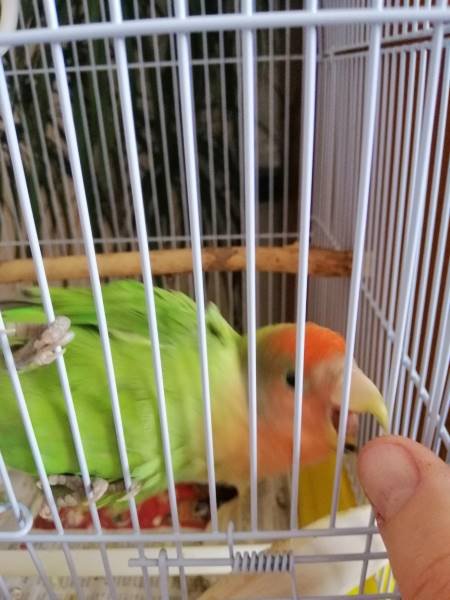Bringing a pet bird home always makes one probable behavioral response from the feathery family member. And if the new addition happens to be a Lovebird, the most common or rather infamous response the bird displays is nipping.
As much as Lovebirds are popular for their cute appearances, they have been known to be equally nippy with their human family members. So, are all lovebirds bite? Is there anything we can do to fix their biting behavior?
Do all pet Lovebirds bite?
The answer is a calm-inducing ‘no’. Not every lovebird adopted happens to be nippy. Some can be just as calm as other pet parrot species. They might not be nippy or just-normal-nippy-until-they-are-trained. Following are the observations of many pet lovebird parents:
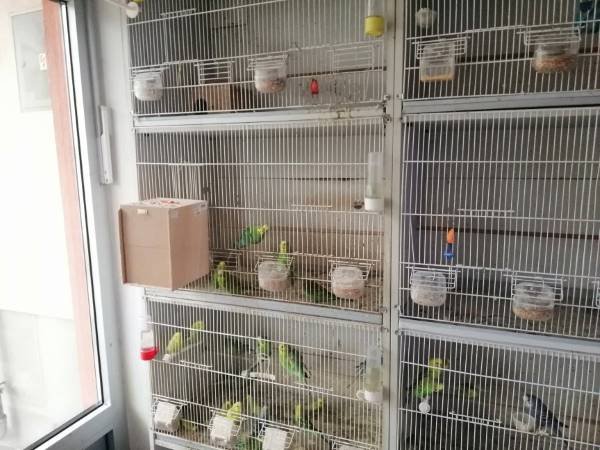
- More often than not, Lovebirds that are adopted from pet stores happen to be nippy. This mainly happens because of the way they are treated by the pet store owners. The sensitive little creatures often get scarred for life with all the rough handling. Also, they never get conditioned to perceive humans as ‘their kind’. And when these birds are adopted, however young they may be, they take their new home as just the next pet store.
- The next chance of having a biting lovebird at home might be when a female Lovebird is adopted rather than the male one. When it comes to lovebird’s behavior, gender seems to play a vital factor. The reason could be attributed to the hormonal changes. With sexual maturity attained and the breeding season on the verge, female lovebirds are known to get nippy, even if they do not have a biting history.
- Another factor that makes a lovebird bite its owner often is whether he is hand-raised or not. A hand-raised lovebird has a great sense of human interaction and is, thus, less likely to bite. Hand-raised lovebirds perceive humans just like their own flock members. On the other hand, a parent-reared lovebird would often be extremely afraid of a human hand and bite an approaching hand hardest perceiving it as a probable danger.
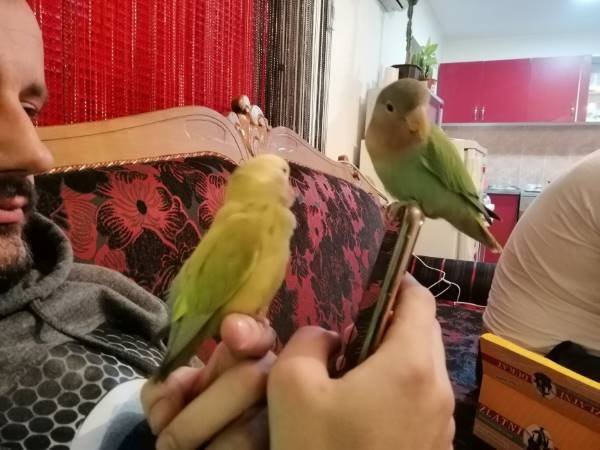
Is every beak interaction a bite?
After having understood when Lovebird bites, it is imperative to distinguish between a bite and a beak interaction. Beak interaction is nothing but a soft, harmless nip. Just as humans use their hands to check things around them, birds are accustomed to using their beaks. Say, to identify a toy or any food-stuff, to preen, climb, or perch, birds would usually use their beaks to nip at them and then go ahead.
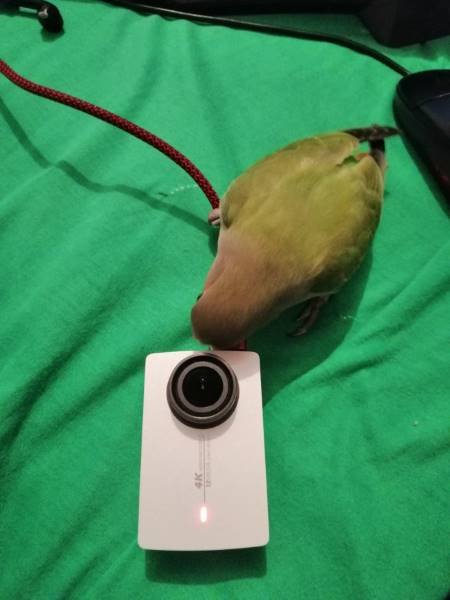
Hence, if the bite of the lovebird is just a soft nip as a part of his inquisitive behavior, it is not a biting behavior. But if it is an unusually hard bite, that is also repetitive, intending to cause hurt, the behavior is surely a biting one and needs to be fixed urgently.
When does a Lovebird bite, hard?
Having identified a real bite from an inquisitive nip, it’s time to know the reason for that bite. It would certainly be impossible to correct a lovebird’s biting behavior if the cause behind it remains unknown. And in the majority of the instances, one would be encountered with a bite that is hard enough to make the finger bleed. Hence, let’s get started in identifying the probable reasons:
Fear
This happens to be the topmost factor of any lovebird’s biting behavior. The fear of humans makes the lovebird panic when approached which, in turn, makes him bite hard. This fear could be found in both adult and infant lovebirds. Where it is easier to wipe this fear out of infants, it may take longer to gain the trust of adult lovebirds by removing this fear. It might not be an easy road for the owner to discover every trauma his adult lovebird might have faced en route to his new home.
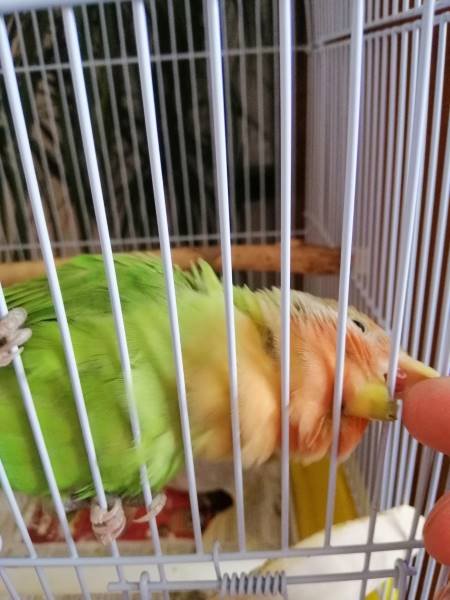
Aggression
An aggressive lovebird is a biting lovebird. When approached in their ‘bad moods’, lovebirds certainly would bite anyone, hard. And there have been enough reports to state that ‘Female Lovebirds often have a higher frequency of bad moods when compared to their male counterparts’. But for both genders, the aggression is either stemmed from the feelings of being territorial or the heightened flux of hormones, especially during the breeding season. And then there are a few secondary reasons that might make a lovebird aggressive. They are stress or depression arising from lack of love or care; lack of physical or mental stimulation; boredom arising out of loneliness, et al.
Insecurity
Any insecure bird would impulsively bite the hand approaching him or his cage. Such insecurity could stem from various reasons like a traumatic past, fear/jealousy of other pets in the house, lack of attention from the mate (human or other bird), the inappropriate placing of the cage, et al.
Cage Size
This might not seem a reason for a lovebird’s biting behavior to most but many lovebird owners have testified that their lovebirds have become less nippy after being shifted to a larger cage. The correlation that can be easily noticed here is the territorial behavior that comes with a smaller-sized cage. That said, not every lovebird housed in a smaller cage would exhibit biting behavior.
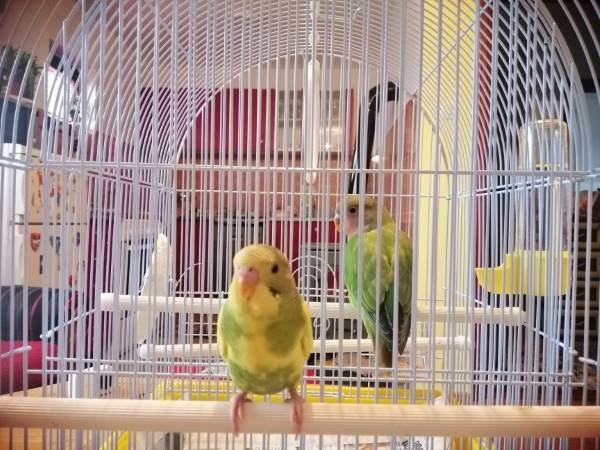
Read more about Lovebird Behavior Here.
Environment
Another factor that can make a pet lovebird bite is the kind of environment he is being raised in. A stressful, noisy house can make even the gentlest lovebird cranky and stressed and prompt him to start biting his favorite human. The simple reason is irritability that stemmed from an unhappy bird.
Hormonal changes
Though the aggression arising from hormonal changes has already been explained earlier, this factor specifically relates to the desire for mating and nesting at the onset of the breeding season. The lovebird might not feel aggressive but needy and helpless if denied a chance to raise a family. Many lovebird owners have seen their happy and ‘non-nippy’ birds resort to hard biting as soon as their baby attains sexual maturity. And lovebird hens are said to be hit most by this somewhere between 1-2 years of age.
How to fix Lovebird biting?
After having identified the probable cause of the biting behavior of the lovebird, it’s time to address the issue to correct it. Following are the few steps that are easy yet effective in taming the nipping act of the lovebird:
Start with small interactions
The first and the most effective way to discourage a lovebird from biting is to start addressing the problem by having small friendly interactions with the bird. This is a one-stop solution for almost all the reasons for the lovebird’s biting behavior.
Feelings of being territorial, small cage size, or any inherent fear; any reason behind the nips can be tackled by offering some time outside the cage, or keeping the cage nearby and talking with the bird softly, singing/ whistling to the lovebird to make the bird comfortable and secured. And when he doesn’t bite the next time you take him out of the cage, reward him with some nuts, seeds, or toys.
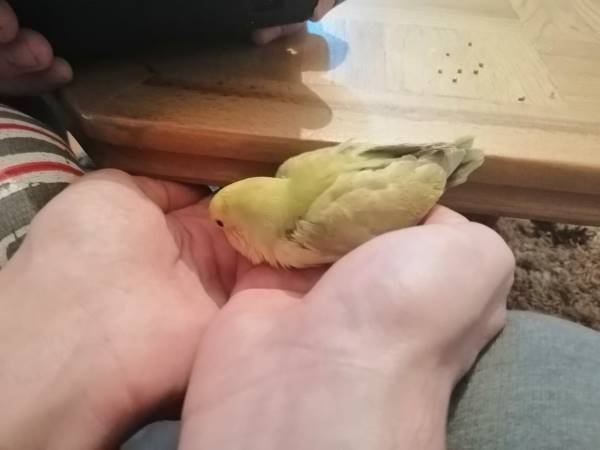
Understand the body language
This is another important way to control the biting behavior of a pet lovebird. Always read the body language of the bird before approaching.
An afraid or aggressive parrot will have its feathers raised so it looks bigger. Also, he will take a stance with his head low to the ground, ready to bite.
If the bird is afraid and doesn’t want to be touched, he’ll probably push himself in the cage corner or squawk seeing your hand approaching inside. It’s time not to go further. The bird will slowly start trusting you for not troubling her.
Stabilize the hormones
For the breeding season’s biting time, the best solution is to stabilize the hormonal fluctuations. Eliminate foods that encourage them to breed, eliminate all dark corners apt for nesting, start covering the cage for a minimum of 12 hours to pretend longer night, et al. And doing all of them at once magnifies the results.
Keep the bird entertained
Never forget that a bored lovebird is a frustrated one too. He’ll certainly bite the owner even if he loves his human. Thus, offer enough entertainment to the bird to keep him happy and engaged. Add toys, play area, or play music or TV to him every day.
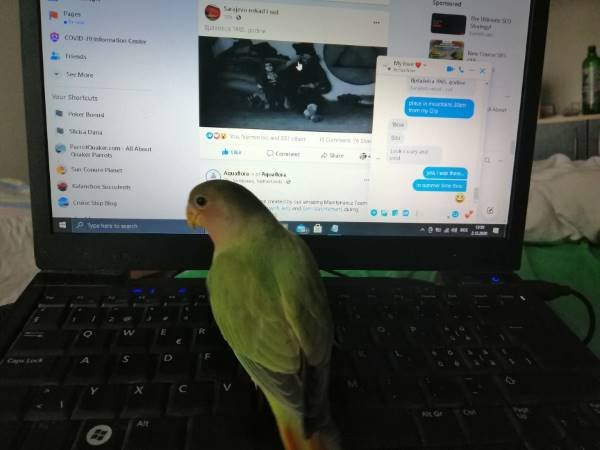
Offer utmost security; in or out of the cage
To make the lovebird feel secured, try to offer utmost security to the bird, not only inside but outside the cage too. Placing the bird’s cage perfectly, offering him soothing surroundings with less noise, keeping strangers away, are a few examples, to begin with. Also, make sure to take care of him every second he’s out of the cage.
Never force the bird
A pet owner must always make sure not to force his will on any of his pet family members. And this holds for a lovebird too. Whether it’s the playtime inside the cage, or flight time outdoors, there’s no point going ahead if the one for whom it is meant, doesn’t agree. Also, it has the repercussion of making the bird aggressive and thus, nippier.
Summing Up
Where soft nipping is normal, hard and hurtful bites are always a concern that needs to be addressed as soon as possible. But the only key here is not to rush things. Take it slow. And if nothing works for a particular lovebird, starting with gaining the trust of the bird would surely do. Earn the trust and never go back on it. The little bird would also never resort back to biting.

